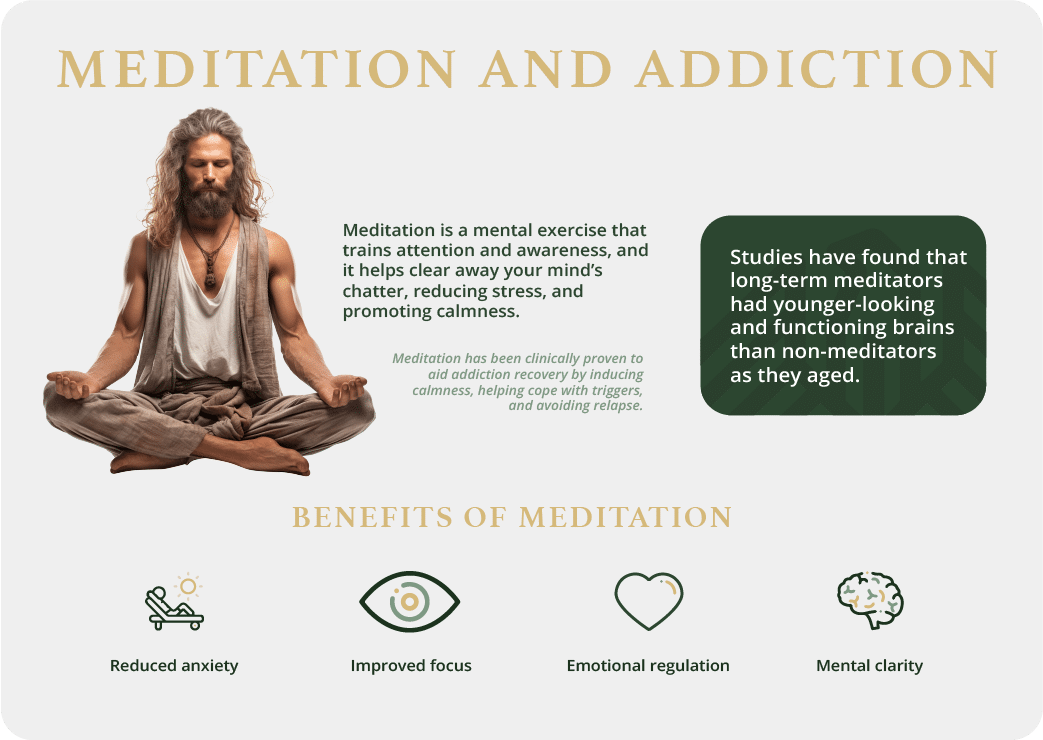Meditation for Addiction: The Benefits
Meditation (blame the media) is often shown as something silly that hippies and tree-huggers do to make themselves feel superior to everyone else. This is not the case, though. Many people do and will benefit from incorporating mediation practices into their daily lives.
The process of recovering from drug and alcohol addiction is different for every single person affected by it. Practicing mindfulness techniques that help with overcoming stress, coping with triggers and cravings, and dealing with anxious thoughts and emotions can speed up and streamline your recovery efforts.
Below is a breakdown of what exactly meditation is, its various types, and how our holistic addiction therapy program can benefit you or a loved one.

Meditation is a mental exercise that trains attention and awareness, and it helps clear away your mind’s chatter, reducing stress, and promoting calmness. It also helps people overcome negative emotions and stress triggers while promoting positive thoughts and emotions.
Can Meditation Help You Overcome Addiction?
Yes. Meditation has been clinically proven to aid addiction recovery by inducing calmness, helping cope with triggers, and avoiding relapse. Meditation techniques themselves are not a substitute for comprehensive addiction treatment under professional supervision, but they have proven to be an invaluable holistic tool.
Many behavioral health rehabilitation facilities, such as Eagle Creek in Nampa and Boise, Idaho, include meditation and mindfulness techniques as a part of our therapy services.

Contact Eagle Creek Ranch
Recovery Today!
Why Wait? Find The Help You Need By Reaching Out To Us Today! Our Admissions Team Is Standing By.
What Are Some Different Types of Meditation?
Meditation, or mindfulness techniques, come in many different types but most involve focusing on a single point of reference, such as one’s breath or bodily sensations, or a word or phrase known as a mantra. Below are a few popular types of meditation techniques:
- Mindfulness Meditation: This technique involves focusing on the present moment and accepting it without judgment and is effective at helping reduce stress and anxiety, improve focus, and promote emotional well-being.
- Spiritual Meditation: This technique involves reflecting on life’s big questions and connecting with a higher power. Wayward souls often find meaning and purpose in their lives through this method.
- Focused Meditation: This technique involves focusing on a single reference point, such as your breath or the flame of a candle. It can help you improve your concentration and shed excess stress.
- Movement Meditation: This technique involves incorporating movement (such as walking or yoga) into meditation. This form of meditation is an all-rounder, as it helps improve both your physical and emotional well-being.
- Mantra Meditation: This technique involves repeating a word or phrase, known as a mantra, to help focus the mind. Oftentimes you will create your mantra to use in this method.
- Transcendental Meditation: This technique involves repeating a mantra for 20 minutes twice a day while sitting with one’s eyes closed. You probably recall seeing this expressed in the media often, usually depicted as someone humming with legs crossed and their palms held facing up and open. It can help reduce stress and anxiety, improve focus, and promote emotional well-being.
- Loving-Kindness Meditation: This method concerns concentrating on feelings of love and kindness towards yourself and others around you. It is good for reducing negative emotions and promoting positive ones.
- Body Scan Meditation: This technique involves focusing on each part of your body, beginning with your toes and working up to your head.
- Visualization Meditation: This technique involves imagining a scene vividly and using all five senses to add as much detail as possible. Creative minds find this method particularly appealing.
What Are the Benefits of Meditation?

Meditation is a powerful tool for everyone, not only those undergoing recovery treatment. Meditation has to be beneficial in the following:
- Reducing anxiety and stress: Meditation helps reduce your body’s cortisol levels. Cortisol is your body’s stress-regulating hormone. This leads to diminished anxiety and an overall sense of well-being.
- Improving focus and concentration: Meditation helps improve focus and concentration by training the mind to stay present and focused on a single reference point.
- Increasing emotional regulation: Meditation helps people recognize and accept negative emotions, especially when done in combination with mindfulness techniques that keep people grounded in experiencing the here and now.
- Enhancing mental clarity: Meditation helps improve mental clarity and cognitive operations by reducing the amount of mind-wandering and daydreaming.
- Improving physical health: Meditation has been shown to have a positive impact on physical health by reducing blood pressure, improving sleep quality, and boosting the immune system.
- Increasing gray matter density in the brain: Studies show a rise in gray matter density in the hippocampus, a brain region linked to memory and learning, and in other brain regions related to emotion regulation and self-awareness.
- Enhancing neural pathway connectivity: Meditation enhances the connectivity of neural pathways, leading to improved cognitive function and increased emotional control.
What Are the Neurological Effects of Meditation on Your Brain?
Meditation has been shown to have numerous positive effects on the human brain. Here are some of the most notable effects:
- Reduced activity in the brain’s “Me Center”: Research has shown that mindfulness meditation decreases activity in the brain’s default mode network (DMN), which is responsible for mind-wandering and self-referential thoughts.
- Rivaling antidepressants for depression and anxiety: A meta-analysis found that meditation reduced symptoms of depression and anxiety equivalent to antidepressants.
- Volume changes in critical brain areas: Research shows that eight weeks of Mindfulness-Based Stress Reduction (MBSR) increases cortical thickness in the hippocampus, which controls learning and memory, and in certain parts of the brain dealing with emotion regulation. This research further confirms decreases in the size of the amygdala, which is the brain’s fear and anxiety command center.
- Improved concentration and attention: One study found that just a couple of weeks of meditation training helped people’s focus and memory during the verbal reasoning section of the GREs.
- Reduced anxiety: Research determined that mindfulness meditation can reduce anxiety by affecting changes in brain regions associated with thoughts about the self. Mindfulness meditation has been clinically great at treating social anxiety disorder.
- Preserved aging brain: One study found that long-term meditators had younger-looking and functioning brains than non-meditators as they aged.
How Can Meditation be Used to Treat Drug and Alcohol Addiction?
Meditation and other mindfulness approaches have proven effective at treating drug and alcohol addiction and at reducing the consumption of alcohol, cocaine, and amphetamines. Meditation helps people relieve stress and cope with triggers that might lead to relapse and delving into drug and alcohol use again. Meditation also helps increase self-awareness and gives people the ability to identify and address how they are feeling at any given moment.
Mindfulness techniques can be incorporated into an addiction treatment program in various ways. For example, they are often used as complementary therapies alongside other treatments such as cognitive-behavioral therapy (CBT) and medication-assisted treatment (MAT), and they can also be used as standalone treatments for addiction.
What Are Some Things to Consider When Exploring Meditation for Recovery?
Meditation can easily become your new best friend while you undergo treatment for substance use disorder (SUD) and alcohol use disorder (AUD). Here are a few things to consider when exploring meditation for recovery:
- Look for a quiet and distraction-free space: Choose a place where you can meditate without being disturbed. This could be a room in your home, a park, or any other quiet space.
- Start small: If you’re just starting out with meditation practices, begin with just a few minutes a day and gradually increase the time as your comfort increases.
- Select a technique that works for you: There are many different flavors of meditation, so choose one that resonates with you. A few popular techniques include mindfulness meditation, spiritual meditation, and focused meditation.
- Be patient: It takes a consistent and patient approach to develop proper meditation skills. You will most likely not see immediate results, but don’t let this discourage you. Keep pushing on.
- Be consistent: Try to meditate at the same time every day, which will help you establish a routine and make meditation a habit.
- Don’t give up: Meditation can be challenging at first, but don’t give up. Stick with it and you’ll soon start to reap the rewards.
- Consider working with a teacher: A meditation tutor can help you learn the basics of meditation more easily and provide guidance and support as you develop your practice.
Breaking the Cycle of Addiction With Meditation at Eagle Creek
Recovery does not end with breaking the connection to the substance you have been addicted to. Healing is not only physical. Lifelong recovery involves treating you as a whole: your body, mind, and spirit. Dealing with the underlying and associated mental health issues that are often the root of addiction is tantamount to helping a person fully recover and never turn back to drug or alcohol use as a crutch.
At Eagle Creek, we offer an all-inclusive addiction treatment program that combines holistic therapies, including mindfulness meditation, recreational therapies, self-care activities, aftercare services, and relapse prevention programs. Meditation is king among these services for prospective clients.
Contact us today to enquire about admissions, available treatment options, and knowledge on how our programs can help live an addiction-free life.

Clinical Director
Kendall Maloof is the clinical director at Eagle Creek Ranch Recovery. She is a licensed marriage and family therapist and has held multiple leadership roles before settling here at Eagle Creek. Kendall received her master’s degree in marriage and family therapy from the Chicago School of Professional Psychology in 2016. Her career in mental and behavioral health began in 2014 when she took up internships in both the nonprofit and for profit sectors. She interned at multiple reputable companies, such as The Living Success Center and 449 Recovery in California.
In 2019, Kendall became the clinical director of Sunsets Recovery for Woman, a dual diagnosis program in southern California. Kendall is a natural leader. She has an incredible ability to problem solve and stay calm in any situation. Kendall never fails to show up when she is needed, and her calm demeanor makes her team and clients feel at ease. Eagle Creek Ranch Recovery is proud to have Kendall as our clinical director.



